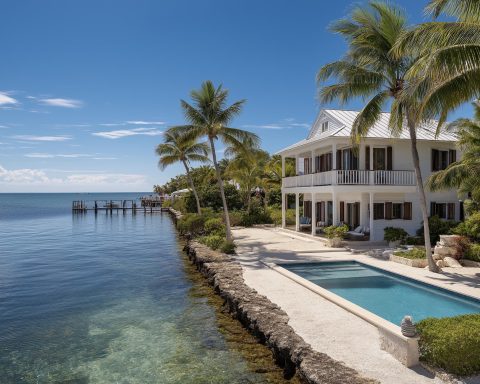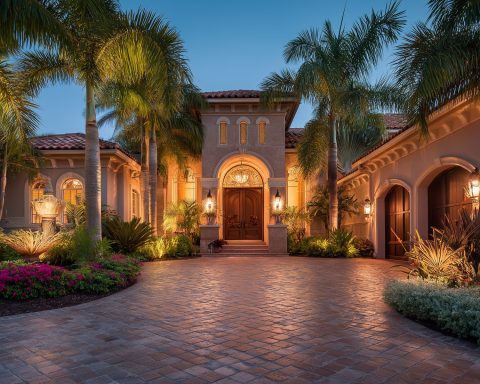Key Facts
- North America: The U.S. saw a $4.2 billion mega-merger as Compass agreed to acquire Anywhere Real Estate, creating the nation’s largest brokerage amid a stagnating housing market reuters.com reuters.com. Meanwhile, Zillow faces a new class-action lawsuit accusing it of deceiving buyers by steering them to its own partner agents reuters.com, a practice one attorney slammed as “playing fast and loose” with homebuyers’ basic needs reuters.com.
- Europe: Housing cool-down hits Europe, with Britain’s asking prices falling annually for the first time since early 2024 reuters.com. Uncertainty over potential property tax changes is dampening buyer demand – “this kind of extended uncertainty can affect market activity,” noted a Rightmove analyst reuters.com. UK rents are still rising but at the slowest pace in four years as more supply hits the market reuters.com.
- Asia: China’s property crisis grinds on despite government support measures. Embattled developer Country Garden won creditor backing to restructure $14 billion in debt reuters.com, but analysts warn the sector is “still struggling to recover” reuters.com. In Vietnam, soaring home prices have left many locals unable to buy; the Prime Minister urged a ramp-up in housing construction and cheaper loans to “cool” the market and improve affordability reuters.com reuters.com. Not all is gloomy – Asia’s tech boom is fueling real estate investment: Singapore’s Keppel DC REIT announced a $555 million purchase of a Tokyo data center to ride a wave of demand for server space amid the AI revolution reuters.com reuters.com.
- Middle East: Record-breaking real estate sales in the Gulf. Saudi Arabia’s housing market is on fire – residential sales in Riyadh surged 63% year-on-year in the first half of 2025 to SAR 65.7 billion (US$17.5B) cbnme.com. The kingdom’s push for 70% homeownership by 2030 and upcoming world events (Expo 2030, World Cup 2034) are stoking demand cbnme.com. A new law enabling foreign property investment in designated zones from 2026 is expected to further intensify buying interest cbnme.com.
- Latin America: Divergent trends across Latin American markets. In Mexico City, rents have spiked as an influx of remote workers and Airbnb rentals reshapes central neighborhoods, fueling anger over locals being priced out reuters.com. Governments are weighing controls, even as investors tap into the nearshoring boom – industrial real estate in Mexico is expected to benefit from U.S. firms moving operations south, though growth could moderate as policies evolve financecolombia.com. Retail real estate remains resilient in major markets like Mexico and Brazil, with rents climbing at or above inflation and occupancy rates holding high financecolombia.com.
- Africa: Optimism returns to African real estate. Rapid urbanization and rising foreign investment have the continent “poised for growth in 2025” estateintel.com. South Africa’s housing market, for example, is rebounding – August saw its fastest annual house price growth in over 3 years according to an FNB index myproperty.co.za, despite high interest rates. Investors are eyeing key cities from Nairobi to Lagos as development hotspots, even as access to finance and infrastructure challenges persist.
North America: Mega-Merger and Legal Battles in a High-Rate Era
Consolidation at the Top: In a blockbuster U.S. deal, Compass Inc. – currently the country’s largest residential brokerage – announced it will acquire Anywhere Real Estate Inc. (the parent of brands like Coldwell Banker and Century 21) in an all-stock transaction valued at $4.2 billion reuters.com. The merger will create a real estate behemoth with about 340,000 agents nationwide reuters.com. Industry analysts say the combo is a strategic response to a stagnant housing market beset by 7% mortgage rates and affordability woes. “Real estate is a volume game & the transaction creates a clear leader” in a tough climate, observed BTIG analyst Jake Fuller of the volume-driven logic behind the deal reuters.com. Compass will absorb Anywhere’s franchise, title and relocation businesses – over $1 billion in revenue – as it girds itself against rising competition and sliding sales. The deal, expected to close in late 2026, underscores how elevated borrowing costs and waning buyer demand are pressuring U.S. real estate firms, spurring consolidation reuters.com.
Zillow in the Crosshairs: Even as brokers band together, the nation’s biggest real estate listings platform Zillow Group is under fire. A proposed class-action lawsuit filed in Seattle accuses Zillow of misleading homebuyers by funneling them toward the company’s own “premier” partner agents rather than the listing agent for a property reuters.com reuters.com. The complaint claims Zillow’s website design dupes buyers into unwittingly contacting Zillow-affiliated agents, from which Zillow allegedly takes a hidden 40% cut of the commission reuters.com. “Zillow has sought to play fast and loose when real people’s basic need of housing is on the table,” said Steve Berman, the lead attorney for the plaintiffs, criticizing the company’s tactics reuters.com. Zillow strenuously denies wrongdoing, calling the lawsuit “a fundamental misrepresentation” of its business and vowing to fight the claims in court reuters.com. The suit comes on the heels of other legal headaches for Zillow – it was sued by rival CoStar for alleged content theft, and by Compass (now its new partner’s owner) for alleged anti-competitive practices reuters.com. Together, the Compass mega-merger and Zillow litigation highlight how North America’s real estate sector is scrambling to adapt – through both consolidation and courtroom battles – to an environment of high interest rates and cooling sales.
Europe: Housing Markets Hit Brakes as Uncertainty Bites
UK Leads a Europe-Wide Slowdown: Across Europe, real estate activity is cooling after years of frenzied growth. In the UK – often a bellwether for the region – house prices have shifted into reverse. September data showed asking prices for newly listed homes down 0.1% year-on-year – the first annual decline Britain has seen since January 2024 reuters.com. Price cuts were most pronounced for high-end properties in southern England, a sign that buyers are maxed out on what they can afford with mortgage rates near 15-year highs. “Rumours of property tax changes” in the upcoming November budget have also put a chill on buyer sentiment, noted Rightmove analyst Colleen Babcock, creating uncertainty that is holding back activity reuters.com. Indeed, would-be buyers and sellers have grown cautious as they await details on potential new housing taxes or incentives. The volume of sales agreed in recent months has dipped below pre-pandemic norms, and homes are taking longer to sell, according to surveyors and property portals, reflecting a market in pause mode.
Rents Easing from Peak Pressures: There is a silver lining for Europe’s millions of renters: rental inflation is finally calming down. In Britain, average rents rose 2.4% in the past year, the slowest annual gain in four years, according to property site Zoopla reuters.com. After several years of steep climbs, rent growth is moderating as more rental homes come onto the market and tenant demand stabilizes. “Lower migration and better mortgage availability for first-time buyers are easing the competition for rented homes,” explained Zoopla’s executive director Richard Donnell, pointing to factors that have expanded rental supply and relieved some pressure on tenants reuters.com. In cities like London and Berlin, landlords are no longer able to hike rents with impunity, and some are even offering small discounts or incentives to fill vacancies – a notable shift after the post-COVID rent surge. Commercial real estate in Europe is also in a holding pattern: high financing costs and recession fears have hit investment volumes, especially in the office sector where vacancies are elevated. However, prime assets (like logistics warehouses and essential retail) are proving more resilient, and some investors are cautiously re-entering markets hoping that European Central Bank rate hikes are now peaking. Overall, Europe’s property markets are entering a phase of slower growth and price corrections, with significant variation between countries – some overheating markets like Sweden and Germany are seeing modest price declines, while others like Spain remain flat. Policymakers are watching closely: the housing cooldown is aiding their fight against inflation, but a sharp property downturn is something they’re keen to avoid.
Asia-Pacific: Crisis in China, Cooling in Vietnam, and a Data Center Gold Rush
China’s Debt-Strapped Developers: Asia’s largest real estate story remains China’s property sector meltdown – a slow-burning crisis that continues to send shockwaves through the economy. Once-mighty developers are in survival mode after defaulting on hundreds of billions in debt and presiding over unfinished apartments across dozens of cities. Country Garden, China’s former #1 homebuilder, has become a symbol of the turmoil. The company – which defaulted on $11 billion in offshore bonds in late 2023 – is now pursuing a painstaking debt restructuring to stay afloat reuters.com. In mid-September, Country Garden won support from 77% of its offshore bondholders (by value) for a plan that would wipe out 78% of its debt reuters.com, just clearing the threshold needed for approval. The developer aims to slash interest payments and extend maturities, buying time to recover sales. It is also asking a Hong Kong court to delay any liquidation proceedings as it negotiates with creditors reuters.com. Beijing has stepped in with a flurry of supportive measures – from lower down-payment requirements to easing home purchase restrictions in big cities reuters.com reuters.com – all intended to revive housing demand. Banks have also been nudged to extend loans and cut mortgage rates. Yet so far, the rescue efforts have only stabilized sentiment temporarily. Property sales remain weak, new construction is at a standstill, and prices continue to drift downward in many cities. “Trade resumption doesn’t mean the debt problem is resolved… The whole sector is still struggling to recover,” warned Eugene Law of China Galaxy International, as Country Garden’s long-suspended shares briefly popped on restructuring hopes reuters.com. The fate of China’s real estate – which accounts for a quarter of its economy – hangs in the balance. Policymakers are walking a tightrope, trying to spur homebuyer confidence without bailing out developers outright. With the giant Evergrande also mired in bankruptcy proceedings, China’s housing slump is likely to drag on, threatening construction jobs, local government finances, and consumer spending across the nation.
Vietnam’s Affordability Squeeze: Elsewhere in Asia, governments are grappling with their own housing challenges. In Vietnam, a multi-year property boom has driven prices out of reach for many citizens, prompting authorities to act. “Many people are in need of housing, but they can’t afford it because of high prices,” Prime Minister Pham Minh Chinh lamented in a meeting on Monday, as he urged measures to boost home construction and cool the market reuters.com. Home prices in major cities like Hanoi and Ho Chi Minh City have jumped ~5.6% so far this year, far outpacing incomes reuters.com. The average apartment in Hanoi now sells for about 80 million dong per square meter (~$3,000) reuters.com – nearly 22 times the average annual salary of a Vietnamese worker reuters.com reuters.com. To tackle this affordability crunch, Vietnam’s government is rolling out a multi-pronged plan. Prime Minister Chinh vowed to cut red tape and costs for developers, accelerating approval of new projects reuters.com. He also directed the central bank to develop loan programs with “reasonable interest rates” for real estate, aiming to make mortgages and developer financing cheaper reuters.com. A big push for social housing is underway as well: cities and provinces are being told to fast-track development of subsidized apartments for low-income residents reuters.com. By increasing housing supply – especially affordable units – officials hope to deflate the price bubble gently. “Properly implementing housing policies and developing the property market will contribute to… sustainable economic growth, while keeping inflation under control,” PM Chinh asserted reuters.com, linking the housing initiative to Vietnam’s broader economic goals. Analysts say Vietnam’s young population and urbanization will keep housing demand strong for years, but speculative excesses needed to be curbed. The government’s challenge will be to tame prices without cratering the construction sector, which is a major growth driver. For now, Vietnam is trying to engineer a soft landing – encouraging builders to produce more units at lower cost, rather than relying on blunt instruments like interest rate hikes or purchase bans.
Data Center Real Estate Booms: Amid the region’s housing headwinds, one bright spot in commercial real estate is emerging: data centers. The explosion of cloud computing and AI-driven services is fueling an unprecedented need for server space, and investors are pouring in. A prime example came this week as Keppel DC REIT, a Singapore-based data center real estate trust, announced a ¥82.1 billion ($555 million) deal to acquire a state-of-the-art data center in Tokyo, Japan reuters.com. The five-story “Tokyo DC 3” facility in Greater Tokyo’s Inzai City is a hyperscale center serving cloud providers, and Keppel will own a 98% stake alongside its parent company reuters.com. Notably, Keppel snagged the asset at roughly a 1.1% discount to its appraised value, reflecting savvy timing as Japan’s data center market heats up reuters.com. This marks Keppel DC REIT’s second data center purchase in Japan, expanding a portfolio that spans Asia-Pacific and Europe. Management touted the acquisition as immediately earnings-accretive and raised over S$400 million in equity to help fund it reuters.com reuters.com. The real significance is the trend it highlights: across Asia, data center investments are surging. Driven by the region’s digital transformation, companies and governments are racing to build the server infrastructure needed for everything from streaming services to AI model training. “The Asia Pacific region witnesses a boom in spending on data centre infrastructure amid the AI race,” Keppel said in its deal announcement reuters.com. Markets like Japan, Singapore, and India are seeing record data center demand, and even traditionally oil-focused Gulf states (e.g. Saudi Arabia, UAE) are investing in massive cloud data farms. Real estate firms are capitalizing by developing or acquiring these highly specialized facilities, which offer stable long-term returns backed by tech giants as tenants. Industry experts note that data centers have become “the new gold” in property investing – with yields often outpacing those of offices or retail – but power and cooling requirements mean only certain locations are viable. In Asia, the data center boom is expected to continue as internet penetration and enterprise cloud adoption still have plenty of room to grow. For investors like Keppel DC REIT, that means more acquisitions ahead in key hubs, and for local economies it means construction of bigger, greener server warehouses to support the digital future.
Middle East: Gulf Housing Booms, Foreign Investors Welcome, and Mega-Projects Galore
Gulf Housing in Overdrive: The Middle East real estate scene is a story of surging growth, especially in the energy-rich Gulf states flush with oil revenue and ambitious development visions. Nowhere is this more apparent than Saudi Arabia, where a combination of genuine end-user demand and government-driven expansion has sent the housing market into overdrive. A new report by consultant Cavendish Maxwell highlights record-smashing sales in Riyadh, the Saudi capital. In the first six months of 2025, residential property sales value in Riyadh soared 63% year-on-year to SAR 65.7 billion (about $17.5 billion) cbnme.com. The city notched over 35,600 home sales in that period – a 10% bump in transactions from a year prior – indicating both higher prices and higher volume cbnme.com. The story is similar in Jeddah, the kingdom’s second city, which saw sales values jump 34% in H1 2025, alongside a 25% rise in deals cbnme.com. Prices for apartments and villas in both cities are climbing at double-digit rates, and even rents are up substantially from last year cbnme.com. What’s driving this red-hot demand? Demographics and investment are a big part of it. Saudi Arabia’s population is young and growing (now over 38 million), and the government has made housing a top priority. The nation is pushing to raise home ownership among Saudi citizens to 70% by 2030 (up from ~60% in 2020) as part of Crown Prince Mohammed bin Salman’s flagship Vision 2030 program cbnme.com. To achieve that, authorities have rolled out subsidized mortgage programs, partnered with developers to build hundreds of thousands of new homes, and opened up new areas of cities for development. At the same time, Saudi Arabia is gearing up to host major global events – notably the Expo 2030 in Riyadh and the 2034 FIFA World Cup – which has spurred a construction frenzy for infrastructure, hotels, and housing. “Demand for real estate in the Kingdom, fuelled by population growth and upcoming events… is at unprecedented levels,” the Cavendish Maxwell report noted, calling the growth trajectory unprecedented cbnme.com cbnme.com.
Policy Modernization and Mega-Projects: To sustain the boom, Gulf governments are also enacting policy changes and launching mega-projects that are reshaping the property landscape. Saudi Arabia made a landmark move this year by approving a law to allow foreign individuals and companies to own real estate in certain designated zones of the country. Starting in January 2026, non-Saudis will, for the first time, be able to directly invest in Saudi properties (mostly within large developments and economic zones), a move expected to “further heighten demand” and international capital flow into the market cbnme.com. Investors from the UAE, China, Europe, and the U.S. are all eyeing opportunities, from Riyadh apartments to Red Sea resort villas. Beyond policy, the sheer scale of development in the Middle East is astonishing. Saudi Arabia’s NEOM – a futuristic $500 billion city in the northwest desert – and The Line (its 170-km linear city) are under construction, potentially housing millions and creating entirely new real estate sub-markets in the coming years. In the UAE, Dubai’s property market remains buoyant; developers are launching new high-end beachfront communities and record-breaking skyscrapers to capitalize on an influx of foreign buyers and expatriates. One standout project, Soluxe in Dubai, just announced a AED 2.2B mixed-use tower that will rise 280 meters on Sheikh Zayed Road cbnme.com. The luxury segment is particularly hot – Dubai’s prime villa prices jumped ~15% over the past year, and even interest rate increases have barely cooled overseas demand. Elsewhere in the region, Qatar is enjoying a post-World Cup real estate uptick: weekly sales in Doha hit QR 394 million ($108M) in early September arabnews.com, and the government is planning new cities to accommodate growth. Egypt, straddling MENA and Africa, is pushing ahead with its New Administrative Capital, a massive new city east of Cairo featuring ministry headquarters and hundreds of thousands of housing units; property prices in parts of Cairo have reportedly doubled in the last 2–3 years, partly as Egyptians plow savings into real assets amid high inflation entrepreneur.com. Across the Middle East, liquidity is abundant thanks to high oil prices, and real estate is a favored vehicle for deployment. While risks remain – e.g. a potential oversupply in some luxury segments, or geopolitical tensions – the overall momentum is strong. As one Riyadh-based consultant put it, “The unprecedented growth… reflects a region balancing tradition with modernity, where investment fuels progress” cbnme.com. The Gulf is leveraging real estate development not just for profit, but as a cornerstone of its economic diversification and global ambitions.
Latin America: Mixed Fortunes – Housing Headaches vs. Investment Bright Spots
Housing Affordability Crunch: Latin America’s real estate narrative is two-sided. On one side, several countries face acute housing affordability problems and social pressures over shelter. A vivid example is Mexico City, where an influx of foreign remote workers and the rise of short-term rentals (like Airbnb) have sent rents in popular neighborhoods skyrocketing. Local residents are increasingly vocal that they’re being displaced and priced out of their own city reuters.com. Rents in Mexico City jumped ~30% from 2019 to 2022 in some districts, and have continued climbing, pushing many middle-class and younger residents to cheaper suburbs. In response, Mexico City authorities have started cracking down on illegal vacation rentals and are debating rent control measures. They’ve also floated plans to convert empty office buildings into apartments to increase supply. The issue isn’t confined to Mexico: across Latin America’s big cities – from Buenos Aires to São Paulo – young professionals struggle with housing costs. In Argentina, a deep economic crisis and inflation over 100% have made mortgages nearly nonexistent, leaving most to rent; Buenos Aires has seen street protests over new rental laws. In Colombia and Brazil, governments are expanding subsidized housing programs to help low-income families. Even relatively stable markets like Chile report that home price growth in recent years has far outpaced wages, prompting concerns about an emerging affordability gap. These pressures have real political impact: public anger over housing costs has become a campaign issue and is forcing policymakers to act. Some cities are experimenting with social housing projects and stricter tenant protections, though critics warn that heavy-handed interventions (like rigid rent caps) could deter investment in new housing. The challenge for Latin America is to stimulate construction – the region has a housing deficit of millions of units – without letting speculation run wild or shutting out the poor. It’s a delicate balance, and each country is navigating it in line with its economic realities.
Investment and Development Trends: On the other side of the coin, parts of Latin America’s real estate sector are thriving, driven by global investment flows and structural trends. Industrial and logistics real estate is one standout. Thanks to the “nearshoring” boom – U.S. and global companies moving manufacturing closer to American shores – Mexico’s industrial property market is red-hot. Demand for warehouses and factory space along the U.S.-Mexico border and in central Mexico has surged. Vacancy rates in prime industrial hubs (like Monterrey and Ciudad Juárez) are at record lows, and rents for modern logistics facilities have jumped. A recent study from Fitch Ratings noted that while nearshoring will strongly benefit Mexican industrial real estate in the medium term, supply is catching up and growth may moderate slightly as companies digest new capacity and governments adjust policies financecolombia.com. Still, industrial developers from around the world (the U.S., Canada, China) are investing in Mexican projects, betting on a multi-year manufacturing shift. In Brazil, industrial real estate is also picking up with e-commerce expansion and an improving economy. Another bright spot is retail and commercial space in the region’s stronger economies. Fitch forecasts that in major markets like Mexico and Brazil, retail real estate will remain robust, with high occupancy rates and rents rising roughly in line with inflation financecolombia.com. Shopping mall foot traffic has bounced back post-pandemic, and international retailers are expanding in cities like São Paulo, Mexico City, and Bogotá, drawn by growing middle classes. Office real estate is more mixed – markets such as Lima and Santiago have relatively low vacancy, but others like Mexico City have a glut of older office space and sluggish return-to-office trends. Mergers and acquisitions are also making waves: this week saw REMAX, the global brokerage franchisor, touting expansion in Ecuador and other Latin countries as part of a strategy to “elevate real estate opportunities” in the region tapinto.net. Additionally, investors from Latin America are increasingly influential abroad: notably, Latin American buyers now account for almost half of new condo sales in Miami, USA, as wealthy families hedge against local instability by purchasing U.S. properties miamiherald.com. This capital flight reflects trust in hard assets and more stable markets overseas. Domestically, Latin nations are courting foreign investment too – for example, Guatemala is marketing itself as a new trade and logistics hub, hoping to attract real estate development for industry and warehousing business.businessinsurrey.com. Overall, Latin America’s real estate outlook is bifurcated. The residential sector faces big social challenges to provide affordable, adequate housing amid population growth and urban migration. At the same time, commercial and industrial sectors present opportunities as economies evolve and integrate into global supply chains. If governments can manage inflation and provide a stable business climate, real estate could be a key growth engine – building everything from factories to data centers to much-needed homes – in the years ahead.
Africa: Brimming Potential and Signs of Recovery
Growth on the Horizon: Africa’s real estate markets are often overlooked, but they are entering 2025 with a sense of optimism and opportunity. Analysts at Estate Intel and other research firms say the continent’s property sector is poised for a significant upswing, thanks to rapid urbanization, improving economic stability in many countries, and increasing interest from foreign investors. “Africa’s real estate market is set to make a comeback in 2025,” one sector outlook noted, citing a projected increase in investment activity across the continent estateintel.com. The fundamentals are compelling: Africa has the world’s fastest-growing cities and a young population entering the workforce. This translates into burgeoning demand for housing, offices, shopping centers, and logistics infrastructure. In major urban hubs like Nairobi, Lagos, and Accra, development is booming to keep pace with growth. Nairobi, for instance, has earned the moniker “Silicon Savannah” as tech companies expand there – boosting need for modern offices and upscale housing for expat workers estateintel.com estateintel.com. Lagos’s population of 20+ million drives relentless demand for homes at all price levels; projections show Nigeria’s real estate market could reach a value of $2.25 trillion by 2025 estateintel.com. Accra, Ghana’s capital, is attracting investors with political stability and has one of Africa’s fastest-growing real estate markets, expected to exceed $530 billion in value by 2025 estateintel.com. Meanwhile, smaller markets like Kigali, Rwanda are gaining attention for specialized opportunities (Rwanda is pioneering sustainable “green” housing developments, for example estateintel.com). Regional economic communities are also investing in cross-border infrastructure, which indirectly boosts real estate by improving connectivity.
South Africa’s Rebound and Challenges: On the southern tip of the continent, South Africa – Africa’s most mature real estate market – is showing signs of recovery after a prolonged slump. The country endured several years of weak growth, high unemployment, and policy uncertainty that dampened property values. But fresh data indicates a turning point: South Africa’s house prices in August 2025 rose at the fastest annual rate in over three years, according to the First National Bank House Price Index myproperty.co.za. This resurgence in home values (albeit single-digit growth) suggests renewed buyer confidence and absorption of excess inventory. Real estate agents report improved activity, especially in middle-class segments and in secondary cities where remote work has boosted housing demand. The Western Cape (Cape Town and surrounds) has been particularly strong, benefiting from semigration – people relocating from other provinces in search of better living standards – which has bolstered mid- and high-end markets. Commercial real estate in South Africa is more mixed: the office sector is still grappling with high vacancy in Johannesburg’s CBD, but industrial property and logistics facilities are thriving thanks to e-commerce and retailers reconfiguring supply chains. Retail malls have largely recovered to pre-pandemic footfall, though load-shedding (rolling power blackouts) remains a risk for operations. One trend is clear: investors are becoming more selective. Capital is flowing into sectors with solid fundamentals (like necessities-based retail and modern logistics) and into well-managed cities, while struggling assets (e.g. older offices) are being repurposed or sold at discounts. Broader Africa faces its share of challenges that temper the optimism. Political instability in a few countries (recent coups in West Africa, for example), hard-currency shortages, and relatively high interest rates in some markets can all weigh on real estate investment. Construction costs have also risen due to global inflation, making projects more expensive. Nonetheless, many African nations are pushing reforms to attract investment – from easing property registration processes to offering tax incentives for development. International players, including private equity funds and Middle Eastern developers, have started venturing into African real estate, drawn by the potential of high growth rates and an undersupply of quality assets. If African governments can maintain economic reforms and stability, the next decade could see an African real estate renaissance, building not just homes and offices, but also wealth for a growing middle class. As one Kenyan developer put it, “The opportunity in Africa’s cities is immense – the key is turning that potential into projects on the ground.” With prudent policies and partnership, Africa’s property markets may well be on the cusp of fulfilling that promise.
Sources
- Sarupya Ganguly – Reuters (Sept 16, 2025): “US housing market to remain stuck in a rut as high rates choke demand” reuters.com reuters.com.
- Aatreyee Dasgupta – Reuters (Sept 22, 2025): “Real estate brokerage Compass to buy rival Anywhere in $4.2 billion deal” reuters.com reuters.com.
- Mike Scarcella – Reuters (Sept 22, 2025): “New lawsuit accuses Zillow of deceiving home buyers” reuters.com reuters.com.
- Suban Abdulla – Reuters (Sept 14, 2025): “UK house prices fall while rents rise by least in 4 years, surveys show” reuters.com reuters.com.
- Cavendish Maxwell via CBNME – Construction Business News Middle East (Sept 22, 2025): “Riyadh Residential Property Sales Surge 63% To SAR65.7 Billion In H1 2025” cbnme.com cbnme.com.
- Khanh Vu – Reuters (Sept 23, 2025): “Vietnam PM calls for more housing to cool real estate prices” reuters.com reuters.com.
- Reuters – Context News (Jan 21, 2025): “Country Garden shares surge in resumed trade after near 10-month halt” reuters.com.
- Rachel Faber – Reuters Video (Aug 11, 2025): “Mexico City looks to ramp up housing as residents say they’re priced out” reuters.com.
- Fitch Ratings – FinanceColombia (Mar 7, 2025): “Fitch Forecasts Growth in Latin America’s Real Estate Market for 2025” financecolombia.com financecolombia.com.
- Estate Intel – Market Outlook (2025): “5 African Cities To Watch For Real Estate Investments in 2025” estateintel.com.
- MyProperty South Africa – Property News (Sep 19, 2025): “Property Prices Maintain Positive Momentum as Regional Recovery Broadens” myproperty.co.za.










